SXSW: Portraits of motherhood in "Ninjababy" and "Bantú Mama"
 Thursday, March 18, 2021 at 7:00PM
Thursday, March 18, 2021 at 7:00PM 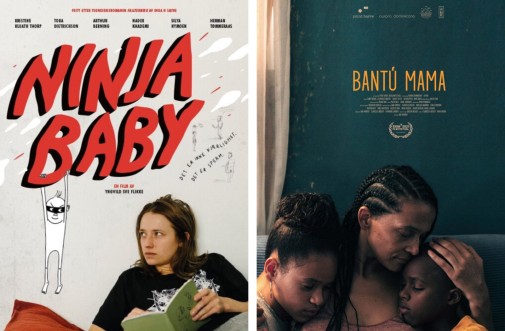
Motherhood is one of cinema's favorite subjects, ever since narrative pictures emerged as a force to be contended with. One can go so far as saying that ever since the origins of drama, of storytelling, tales of mothers have dominated audiences' attentions, defined cultures, were made into the foundations for moral and religious belief. Perhaps because of such history, such conceptual weight, mainstream cinema rarely attempts to subvert or question the precepts of dramatized maternity. Even in more independent circuits, there's still reverence there, a willingness to prop up the mother figure into a saintly paragon, idealized caretaker, matriarch of humanity.
Because of it, one feels grateful when artists turn their back on all that baggage and decide to subvert what cinematic mothers are, what they look like, what they represent. The irreverent Ninjababy and the beautiful Bantú Mama, both presented at the SXSW film festival, are prime examples of this…
Directed and written by Yngvild Sve Flikke, Ninjababy tells a story of unwanted pregnancy and a mother-to-be whose lack of maternal feelings are both unapologetic and explored with no shame. Rakel, a 23-year-old aspiring cartoonist, finds out she's with child six months into her pregnancy, too late to have an abortion despite her resolute unwillingness to become someone's parent. The kid's father, a fellow nicknamed Dick Jesus, initially also shows little interest in being a father, so Rakel looks into adoption alternatives even as she worries that her partying, drinking and general irresponsibility, may have had detrimental effects on the fetus.
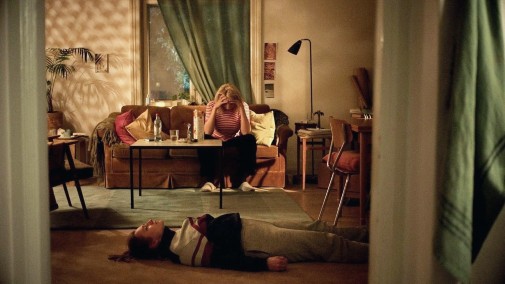
In no time at all, her artwork drifts from the page into her view of the word, two-dimensional scribbles projecting Rakel's imagination into a world captures with an otherwise naturalistic aesthetic. While some images haunt, like the woman's hand melting into nothingness through superimposed animation, what such mechanism adds to the film is the humoristic appearance of its titular figure. Ninjababy is the manifestation of the fetus as a wisecracking companion to this woman whose body never conforms to what most people expect from a pregnant person.
Neither does her attitude towards these predicaments. Embodying Rakel, Kristine Kujath Thorp is like a cannon-ball, flying through the story with an obstinate fervor and a penchant for messy destruction. Neither actress nor film ever judges this negatively or vilifies Rakel. Watching her is never less than riveting, and the same can be said about the whole cast whose negotiation of levity and incisiveness deserves praise. Through these magnetic performances, the cartoon baby, and a series of wacky situations, Flikke weaves a tapestry of unassuming observations shot through with a sense of humor leaning towards absurdism.
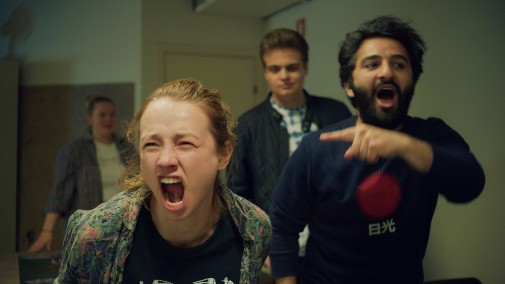
A sequence, late in the film, when the morning after a glorious first date is interrupted by what appears to be every main character in the movie is a screwball-y delight. It reminded me of Noah Baumbach's Mistress America in that regard, marrying contemporary realism with an old-school taste for funny contrivance. Overall, Ninjababy succeeds at making such a tricky proposition work, remaining quirky while not drowning in forced whimsy. I only wish it was more visually exciting, more willing to let Rakel's artistic tendencies shape our view of her world. The animation is a nice touch, if a bit clichéd, but it never feels enough.
If Ninjababy confronts the matter of modern motherhood by presenting someone who's unbending in her refusal to accept it even as her body betrays her will, Bantú Mama shows us someone who becomes a matriarch through circumstance, through care and her heart's will, rather than biology or societal pressure. Iván Herrera's second narrative feature centers around Emma, an Afro-European woman of Cameroonian heritage who finds herself in trouble with the law when traveling abroad. In the Dominican Republic on vacation, Emma is arrested but manages to escape.
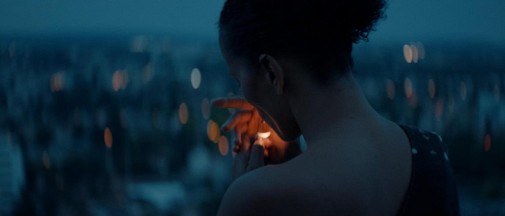
Swimming to freedom in a flurry of panic, she finds refuge in the community of Santo Domingo, specifically a household where three young siblings of Haitian origin live alone. Through Emma's eyes, Herrera explores the place of his childhood home, letting his camera become intoxicated by its sights and sounds, the cinematic picture struggling to capture all the wonders the director aims at crystalizing. Flavors and the minutia of local accents are hinted at, stretching the limits of a docu-like form, marrying hand-held roughness with a lyrical passion for saturated colors, expressive sound mixes, and an abstract electronic hum reverberating through the score.
The script of Bantú Mama's vague to a fault, keeping Emma's motives and secrets hidden from the other characters and viewers alike. Nonetheless, there's precious clarity in Clarisse Albrecht's portrayal of the protagonist. Working as both actress and co-writer, this French performer finds the specificities in her role's deliberately nebulous interiority. While we may question the reasons that got Emma in the imbroglio at present, we can be sure that her growing attachment to her young saviors is genuine. Just as they rescued her, she seems keen on rescuing them, though both parties can't seem to agree on the parameters of the dynamic.
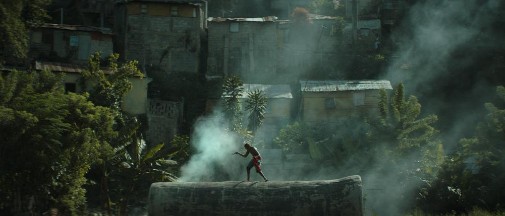
A familial bond is forged in these dangerous scenarios, surprising motherly intent finding a filial need. Emptiness if filled and the quiet comfort of silence transfigures into the constant buzz of a shared life. Whilst the idea of a woman needing to care for someone to have purpose is odiously retrograde, there's no judgment in the feature's storytelling. Like Ninjababy, Bantú Mama resists making its central character into a symbol. Emma is Emma in all her puzzle-like mysteries, her willingness to survive, her newfound ability to share herself with others. With splendorous cinematography and this fascinating lead, Bantú Mama goes beyond a stereotypical tale of violence experienced by foreign outsiders. It's a song of love about Santo Domingo, a melancholic reverie of maternal affection, love blossoming in times of strife.
Ninjababy and Bantú Mama are showing at SXSW Online 2021.
 Bantú Mama,
Bantú Mama,  Dominican Republic,
Dominican Republic,  Ninjababy,
Ninjababy,  Norway,
Norway,  Reviews,
Reviews,  SXSW,
SXSW,  Scandinavia,
Scandinavia,  foreign films
foreign films 


Reader Comments (1)
I saw Ninjababy at the Berlin Film festival in the beginning of March and really enjoyed it. Didn't feel a bit strange that somebody does not want to be a mother to her unborn child and a nice screenplay how she called him a ninjababy while being a cartoon artist and then the ninjababy appearing as a cartoon character. The road throughout the film to look for the father was also a fun one. The subtle cartoon additions made it even slightly special compared to usual romcoms.